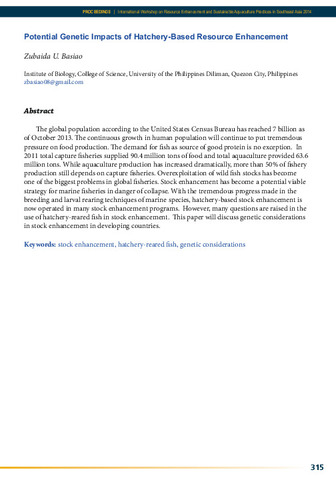Potential genetic impacts of hatchery-based resource enhancement
- Global styles
- MLA
- Vancouver
- Elsevier - Harvard
- APA
- Help
Share
Abstract
The global population according to the United States Census Bureau has reached 7 billion as of October 2013. The continuous growth in human population will continue to put tremendous pressure on food production. The demand for fish as source of good protein is no exception. In 2011 total capture fisheries supplied 90.4 million tons of food and total aquaculture provided 63.6 million tons. While aquaculture production has increased dramatically, more than 50% of fishery production still depends on capture fisheries. Overexploitation of wild fish stocks has become one of the biggest problems in global fisheries. Stock enhancement has become a potential viable strategy for marine fisheries in danger of collapse. With the tremendous progress made in the breeding and larval rearing techniques of marine species, hatchery-based stock enhancement is now operated in many stock enhancement programs. However, many questions are raised in the use of hatchery-reared fish in stock enhancement. This paper will discuss genetic considerations in stock enhancement in developing countries.
Description
Abstract only.
Suggested Citation
Basiao, Z. U. (2015). Potential genetic impacts of hatchery-based resource enhancement. In M. R. R. Romana-Eguia, F. D. Parado-Estepa, N. D. Salayo, & M. J. H. Lebata-Ramos (Eds.), Resource Enhancement and Sustainable Aquaculture Practices in Southeast Asia: Challenges in Responsible Production of Aquatic Species: Proceedings of the International Workshop on Resource Enhancement and Sustainable Aquaculture Practices in Southeast Asia 2014 (RESA) (p. 315). Tigbauan, Iloilo, Philippines: Aquaculture Department, Southeast Asian Fisheries Development Center.
Type
Conference paperISBN
9789719931041


